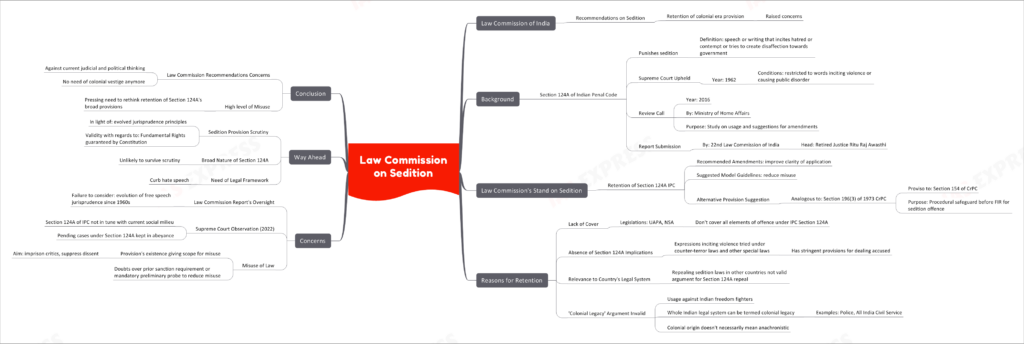Law Commission on Sedition- Background, Recommendations & Concerns

This topic of “Law Commission on Sedition- Background, Recommendations & Concerns” is important from the perspective of the UPSC IAS Examination, which falls under General Studies Portion.
Intro:
Recently, the Law Commission of India gave its recommendations on sedition in a report to the government. Its calling for retention of the colonial era provision has raised some concerns.

Background:
- Section 124A of the Indian Penal Code seeks to punish sedition i.e. speech or writing that brings/ attempts to bring into hatred or contempt or excites or tries to excite disaffection towards the government established by law.
- The Supreme Court had upheld its validity as far back as 1962. However, the court held that it should be restricted to words that have a tendency to incite violence or trigger public disorder.
- In 2016, the Law Commission had received a reference from the Ministry of Home Affairs, calling for a study on the usage of the provision under Section 124A and suggestions for amendments.
- The 22nd Law Commission of India, under retired Justice Ritu Raj Awasthi, recently submitted the report to the government.
What did the Law Commission say about sedition?
- It has called for the retention of Section 124A of IPC. However, it has also recommended some amendments to improve the clarity regarding its application.
- It has recommended that the central government issue model guidelines to reduce its misuse.
- It has also suggested an alternative- incorporation of a provision, analogous to Section 196(3) of the 1973 CrPC, as a proviso to Section 154 of CrPC. This could provide procedural safeguard before an FIR is filed for a sedition offence.
What were the reasons given?
- The Law Commission of India said that the existence of legislations like UAPA (Unlawful Activities (Prevention) Act) and NSA (National Security Act) doesn’t, by implication, cover all elements of offence envisaged under the IPC Section 124A.
- In the absence of Section 124A, expressions inciting violence against the government would be invariably tried under counter-terror laws and other special laws. Such laws have more stringent provisions for dealing with the accused persons.
- The Commission also pointed out that each country’s legal system has its own set of ground realities to tackle. Hence, the fact that certain countries have repealed sedition laws cannot be an argument for repealing Section 124A.
- It has also held that the provision being a ‘colonial legacy’ isn’t a valid ground for its scrapping.
- It is true that the sedition provision is noted for its usage against the Indian freedom fighters.
- However, going with this argument, the entire Indian legal system could be termed a colonial legacy. For instance, it can be argued that the police and the All India Civil Service are also remnants of British colonialism in India.
- Just because a law/ institution is ‘colonial’ in origin doesn’t necessarily mean that it is anachronistic.
Why is this of concern?
- Experts have noted that the Law Commission’s report fails to consider how far the free speech jurisprudence has evolved since the 1960s.
- In 2022, the Supreme Court kept all pending cases under Section 124A in abeyance and observed that “the rigours of Section 124A of IPC are not in tune with the current social milieu”.
- Though the report argues that a law’s mere misuse isn’t grounds for its repeal, it hasn’t considered how the provision’s very existence is giving great scope for its misuse, especially with a deliberate intent to imprison critics and suppress dissent.
- There are doubts about whether a mere prior sanction requirement or a mandatory preliminary probe would help reduce the misuse of Section 124A.
What is the way ahead?
- It is high time to consider the sedition provision in light of the evolved jurisprudence principles to test its validity with regards to the Fundamental Rights guaranteed by the Constitution.
- Considering the broad nature of Section 124A, it is unlikely to survive such a scrutiny.
- Meanwhile, an effective legal framework needs to be introduced to curb hate speech. Such a provision is more necessary now than a law penalizing speech/ writings against the government.
Conclusion:
There are concerns that the Law Commission’s recommendations and arguments regarding Section 124A flies in face of the current judicial and political thinking in India that we don’t need this colonial vestige anymore. Given the high level of misuse (as seen from the low rate of conviction), there is a pressing need to rethink the retention of Section 124A’s broad provisions.
Practice Question for Mains:
Discuss the recommendations of the Law Commission on sedition. What is the way ahead? (250 words).

